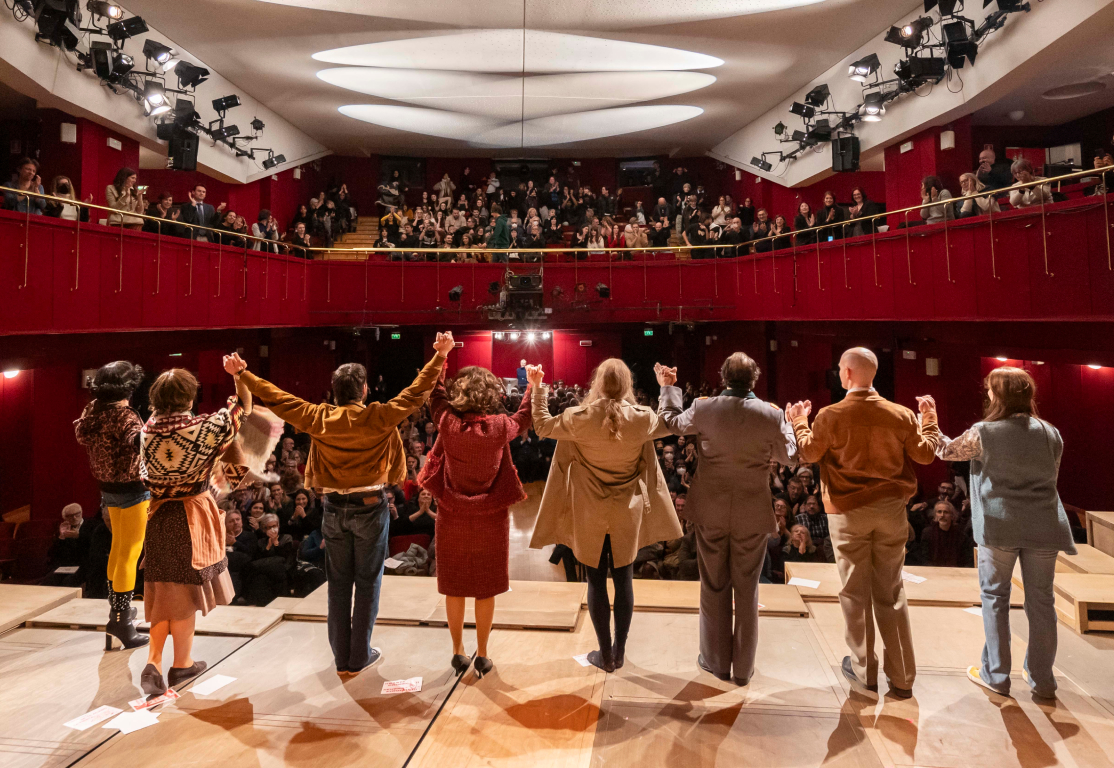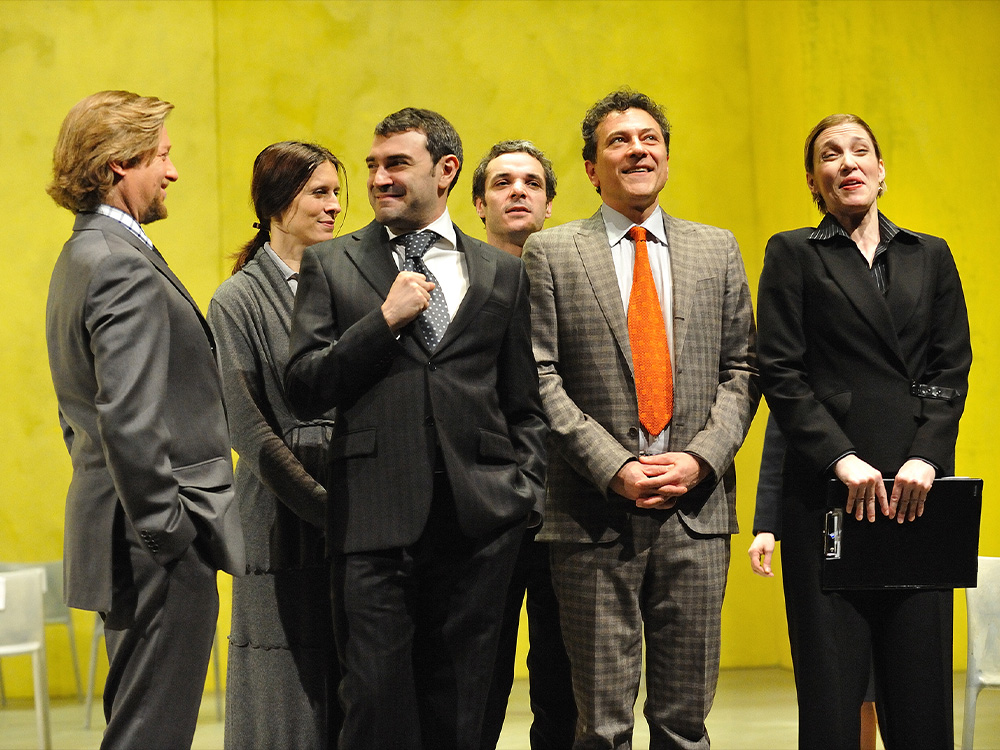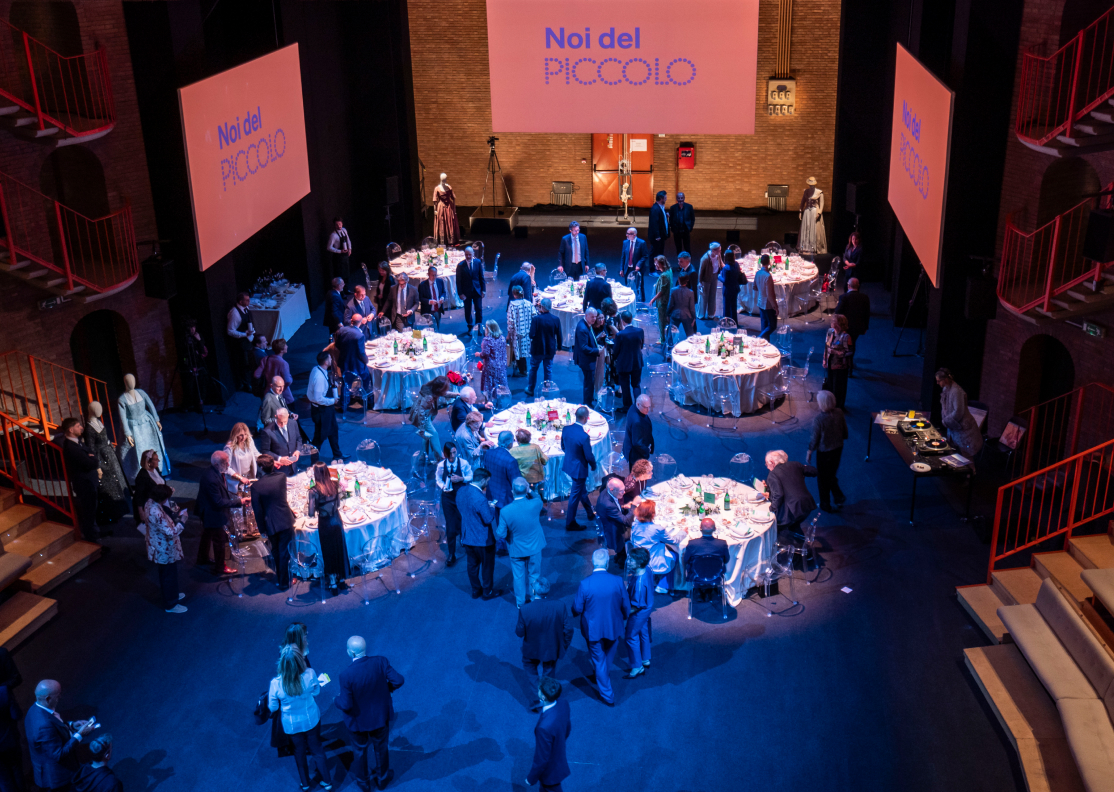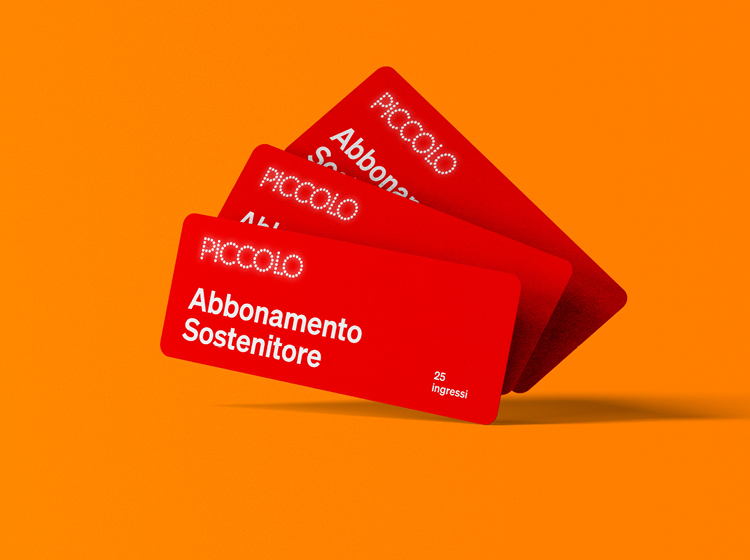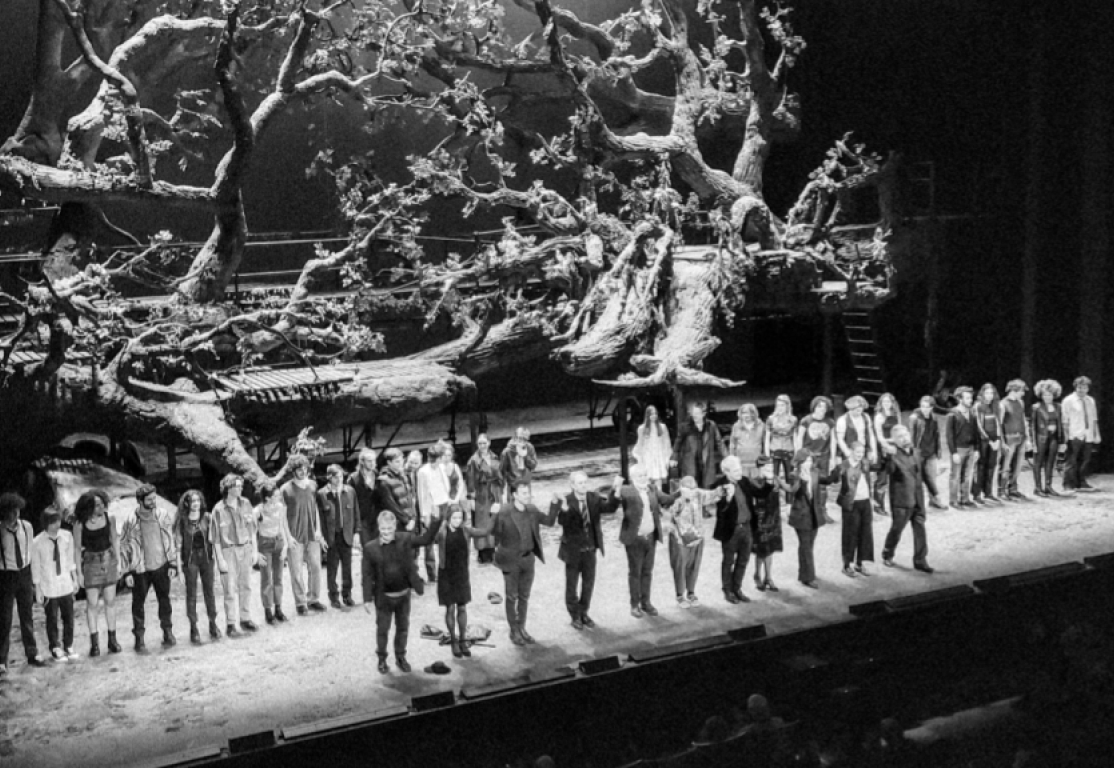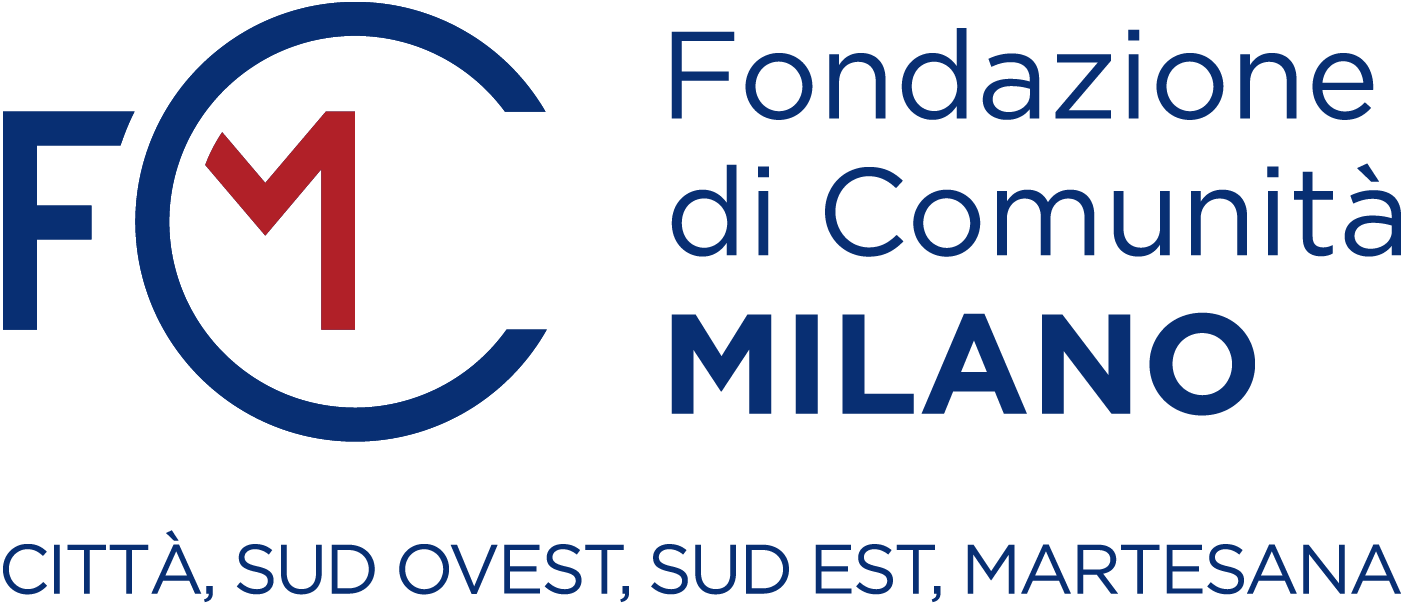Sometimes [...] I get this strange urge to break the windows, jump out, and run around outdoors until someone gets in my way, someone I'd grab by the arm and shake real hard to wipe the stunned look off their face. I’d make them mine for the night, all mine: to touch (He feels the air with his fingers.), to smell (He sniffs.); someone I could explain everything to: «Don’t worry,» I’d say, «take it easy - all you’ve got in front of you is a person who just needs to hear someone else breathing, someone who just needs to hear another heart beating. I broke all the windows and jumped right out, just so that I could touch somebody. It’s this feeling I get on nights like tonight. I’m just a person who’s too much of a person to stand being locked up all by myself.»
Bernard-Marie Koltès, Sallinger
... the physical, worldy in-between along with its interests is overlaid and, as it were, overgrown with an altogether different in-between which consists of deeds and words and owes its origin exclusively to men’s acting and speaking directly to one another.
Hannah Arendt, Vita activa. The Human Condition
I am not one for museums […] I prefer seeing the city, the people, the shops, the streets, the urban fabric, the colours of the suburbs, the sunrises and sunsets, understanding the humanity, equal and diverse, in the various communities.
Paolo Grassi, Pittori e musei, in Id., Quarant’anni di palcoscenico
DISCOVER THE SHOWS
BROWSE THE SEASON PROGRAMME
Is it still possible to depict the world of today through theatre? Around seventy years ago, in the same period in which, in Milan, Strehler was preparing to orchestrate, with epic mastery, his refined Threepenny Opera, a very young Peter Szondi, studying the phenomenal vitality of Berlin theatre from his eccentric observatory within the austere halls of the University of Zurich in an attempt to codify the generative (and fatally transformational) language of “modern drama”, identified, through analysis of the relations between individuals, the cornerstone of contemporary theatre. According to the Hungarian scholar, the «bold intellectual effort made by a newly self-conscious being» of the Renaissance «after the collapse of the medieval world view» led to the inescapable declaration of dominion over «interpersonal relationships» as an essential aspect of modern dramaturgy. The conclusions came swiftly: «Man», nowadays, can enter drama «only as a fellow human being»; the sphere of «interpersonal relationships» is an «essential part of his being»; «freedom and obligation, will and decision» are «the most important of his attributes».
Szondi was right in his thinking; it is within the vibrant and impassioned debate between “you” and “I”, in the determined close combat between “you” and “us”, in the intricate mass of contradicting ties between “him” or “her” and “them” that we must doggedly continue to seek the meaning of contemporary theatre (and perhaps even its future). It is in the fissures that furtively open between interlocutors, between the fault lines that suddenly split debates, and in the suspended silence that slips between the solitude of subjects, that theatre needs to persistently dig, to shed light on the impenetrable “middle ground” in relationships, and on the abyss of fear, desire, affinity, hatred, appetite, curiosity and indifference that drives relations. This impalpable and pulsating “middle ground”, the rich hummus of our inexhaustible need to find “completion” in others, offers fertile soil for our possibility to create community, on all levels and under the most varied of forms, be it as a couple, a family, a group of friends or a city...
Without ever abandoning its constant striving to explore the transformation of contemporary theatrical language in search of future possibilities, the 2025/26 season at the Piccolo Teatro di Milano marks the beginning of a journey towards celebrating its eightieth anniversary, examining the ties between the theatre and the city that formed the very basis of the founding project launched by Strehler and Grassi, beginning with a study of the most authentic and profound etymons of this fundamental bond: relationship.
Following the thread of an attentive analysis of contemporary dramaturgy, the productions by the Piccolo for the coming season offer a rich catalogue of the many “expressions of relationship” that present, through incisive “portraits”, a shifting reportage of our present made up of intimate cuts into the flesh of our inmost passions and desires, as well as sweeping panoramas that blow open the deafening labyrinth of passages that wind through our cities; of more or less composed “portraits of a family at home” and of slightly faded snapshots that foster old friendships, and of fascinating glimpses of history and bold visions of “times to come”, reminding us that «the end is» always «in the beginning and yet you go on»...
And there is more: hilarious pictures that tell an improvised tale of theatre’s funambulatory play on identity; laconic sketches that draw on language to freeze a complex embrace in silence; dizzying montages that express the polyphony of eras and cultures; violent slashes to understand the wounds within memory and imagine the contours of crumbling recollections, and lastly, darkness that fatally engulfs all annihilation of diversity. “Never come between a husband and wife”, the saying goes...
And so, perhaps, in a civil dialogue between us – in the “Calvino-esque” manner of Kublai Khan and Marco Polo –, sailing from show to show, between the Scylla and Charybdis of Babylon and Utopia, beyond the mythical archipelagos of the floating isles that lie on the horizon of our future, in a deluge of “with” and “close” and “against” and “adverse” and “to” and “between” or “among”, an elegant carousel of “expressions of relationship” leads us to reach (or build?) the ideal city: For these ports, I could not draw a route on the map or set a date for the landing. At times all I need is a brief glimpse, an opening in the midst of an incongruous landscape, a glint of lights in the fog, the dialogue of two passersby meeting in the crowd, and I think that, setting out from there, I will put together, piece by piece, the perfect city, made of fragments mixed with the rest, of instants separated by intervals, of signals one sends out, not knowing who receives them. If I tell you that the city toward which my journey tends is discontinuous in space and time, now scattered, now more condensed, you must not believe the search for it can stop. Perhaps while we speak, it is rising, scattered, within the confines of your empire; you can hunt for it, but only in the way I have said...
Claudio Longhi
Artistic Director Piccolo Teatro di Milano – Teatro d’Europa
Who, today, are the “all” of which the founding motto of the Piccolo “Teatro d’arte per tutti” speaks, and in whose service we work, day after day? This is the question that Claudio Longhi and I have been asking ourselves since we began working towards our common goal. In a context of increasingly international horizons marked, periodically, by conflict, uncertainty and fragility, we are called on to stand strong in the face of fear and care for our community. Our aim is to work and exist in the present, in a responsible manner and with the belief that theatre and art make us better people.
Indeed, since the very beginning, theatre has always been a place for and an expression of the community, somewhere in which it can present itself in its many forms, in the irreducible wealth of its differences and its nuances. It is this extraordinary variety, like the strands of a web, that the Piccolo aims to examine, and to which it seeks to guarantee full and unlimited access. Our theatrical community is a cross section of the city in which we live, and we believe that it should represent all citizens, Milanese or not.
Together with all those who work for the Piccolo, with their daily efforts, their professionalism and their responsibility, we first and foremost wish to address the children who have their first experiences of theatre thanks to educational programmes, and the young people from all walks of life, cultures and social backgrounds, to ensure that they all feel part of the Theatre of the city of Milan, and that, with us, they can explore the beauty, the wonder and the excitement of theatrical expression. This is one of the reasons that lies behind the launch of our new project, Piccolo <35, which combines opportunities for encounter and sharing with in-depth studies of the classics of theatre and explorations, together, of the new contemporary scene. Particular attention will also be dedicated to other segments of the public, through specific proposals.
Activities related to Oltre la scena and Agorà della Cultura continue, and we also have the new Piccolo Aperto project, the goal of which is to promote practical accessibility and an all-round theatrical experience, with services aimed at removing all forms of barrier, be they cultural, architectural, sensory, cognitive or economic.
Our city is now home to a population of which more than 20% is foreign; a “potential” audience that still rarely ventures to our theatres. “International Milanese” of wide-ranging origin and profession, as well as a multitude of young university students studying finance, fashion and design. These are joined by the increasingly numerous tourists who come, either for just a few days or longer, to explore the city. We are now working, also with the use of surtitles for weekend performances of productions and collaborations, to welcome them with new shows.
With a view discovering, together, who the new “all” are, Autumn 2025 will see the launch of a convention together with other cultural and theatrical organisations entitled Interesse pubblico (Public interest), which forms part of the New audiences project. The support of the Founding Partners and institutional partners of the Piccolo is an essential factor for the sustainability of artistic activities and events for the public; in addition to these figures, a precious element is, now more than ever, the involvement of the Milanese, Italian and international business world that, ever since the founding of the Piccolo, has sustained the Piccolo, forming a beneficial treaty in the post-war period that contributed to the cultural rebirth of our city, and that now, through its constant and enthusiastic support, provides a powerful stimulus for innovation, including within the theatrical world.
The Piccolo creates networks: this is its most authentic characteristic. It does so in the etymological sense, drawing on the creative power of relationships. A net is, by definition, an interweaving of threads of various material, knotted and woven together. It has always sought connections with a broad range of institutions with the common goal of cultural programming, such as the Triennale, Grande Brera and Teatro alla Scala. It also forms networks with Fashion and Design, voices that create material culture and art. One new horizon in this network, for the coming season, is Milano Cortina 2026, which will see the participation of the Piccolo as the first Italian theatre with a programme dedicated to the Cultural Olympiad, the constellation of initiatives organised around the sports event that echo its significance.
This is the vision and commitment of us, here at the Piccolo, where we have learned to create a form of theatre that is, both in idea and practice, for all, for the entire community: a community for which it is the theatre’s duty to care, just as the theatre is a shared asset that the community has the duty to nurture. Both through reciprocal openness, responsibility and kindness.
Lanfranco Li Cauli
CEO – Chief Executive Officer Piccolo Teatro di Milano – Teatro d’Europa


